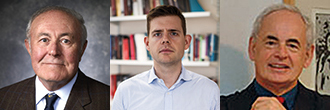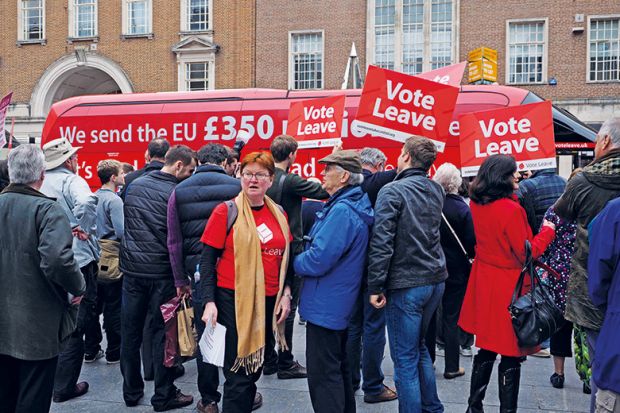The British public does not have a settled view on Europe. The authors of this detailed study, underpinned by new data and new analyses of existing surveys, reveal that in 2005 50 per cent of UK voters approved of Britain being in the European Union, and only 36 per cent disapproved. Everything changed after the 2010 election, and by 2012 those numbers were reversed. But they had flipped again by the 2015 general election, with almost 50 per cent pro-EU and only 37 per cent disapproving.
But by the eve of the 2016 referendum, a majority chose negative words when asked to describe how they felt about EU membership. The two most highly significant predictors of how any individual voted were their attitudes to immigration and whether they had come to believe that “Britain no longer controls its own economy”.
Brexit: Why Britain Voted to Leave the European Union reveals that there was a “Boris effect” because Boris Johnson was likeable in 2016, and when he came out for Leave, it mattered. On likeability, he scored 4.5 out of 10 against Jeremy Corbyn’s 4.2, David Cameron’s 3.5 and Nigel Farage’s 3.2. Of those who gave him 9 out of 10 for likeability, 90 per cent voted Leave. It was not Boris wot won it, but his support for Leave clearly mattered more than Nigel’s.
Other conclusions that Harold Clarke, Matthew Goodwin and Paul Whiteley draw are less plausible. In analysing the European Social Survey, they suggest that “Britain is not that much different from other countries in the EU when it comes to explaining the sources of Euroscepticism”. But this fails to explain the lack of a significant Eurosceptic vote in the Netherlands on 15 March 2017. Clearly the Dutch are different, but why?
The authors conclude that the British are not unusually racist among Europeans, although this is hardly surprising, given that the UK has been a multicultural society for longer than most of Europe. Their analysis also reveals that the Swedes and Germans are now, on average, the least racist people in Europe, as expressed in surveys about ethnicity and immigration.
The British appear easily swayed. When the referendum was called, the polls suggested Remain would win. The final vote was incredibly close: 51.9 per cent to 48.1 per cent. In one of the authors’ more interesting new analyses, they simulate 1 million referendums with a higher turnout than 72.2 per cent, and claim that Remain would have won in 660,300 of those contests.
Leavers are described as “an army of activists who, ever since their defeat at an earlier referendum in 1975 and in subsequent controversy surrounding the ratification of the Maastricht Treaty in 1992, had been plotting to mobilize a new revolt to extricate Britain from the EU”. Ukip are identified as the army’s core, but the party’s membership was small and, according to yet another analysis of new data revealed here, “not very active”. They are 99 per cent white, 10 times more likely to have voted Conservative than Labour in the past, and typically are old men harbouring a significantly greater dislike of Muslims than the majority of the population.
The Leave campaign had many factions, and was hardly a disciplined army. This book identifies its plotter in chief as Matthew Elliott, former chief executive of the TaxPayers’ Alliance, a group funded by anonymous affluent people trying to pay less tax. Elliott was a 12-year-old schoolboy when the Maastricht Treaty was signed. Ukip’s main donor, Arron Banks, made his fortune having “set up 37 different companies using slight variations of his name” , The Guardian reported. This book does not go into his past, or into Elliott’s motivations, or those of Farage or any of the other key figures in the scramble to Leave.
Leave campaigners’ tactics, however, are described in detail. Dog-whistle politics was used to stir up a fear of immigrants: “Dominic Cummings, the lead strategist for Vote Leave, had taken to social media to suggest publicly that voting to remain in the EU could increase the chance of Cologne-style mass sex attacks on Britain’s streets.” Farage talked of a coming “flood of jihadists”.
The Sun and Daily Mail are identified as the country’s key Eurosceptic newspapers, denouncing those concerned about Brexit’s impact as “Project Fear” scaremongers. Cameron warned that a holiday in Europe would rise by £230 (which it did, when the pound plummeted following the vote); the Trades Union Congress predicted that average weekly workers’ wages would be £38 lower by 2030 (we’ll have to wait and see); Tesco bosses said food prices would rise (as they have).
As polling day approached, voters began to doubt both campaigns. In three polls held in June 2016, twice as many voters saw both sides as “mostly dishonest” than thought they were “mostly honest”. On the eve of the poll a majority thought both campaigns were negative. This is how the prime minister, trade unions and supermarket bosses lost and a small group of men from the far Right fringe won.
The authors blame globalisation for the vote for Brexit, but globalism affects all countries. They cite the argument that immigration depresses wages at the bottom and inflates them at the top. So perhaps the general public had been convinced that rising income inequality was due to rising immigration that was due to Britain’s membership in the EU. But why is income inequality lower in all other EU countries, including those with a much higher rate of in-migration than the UK?
Referendums in Britain tend to be won by the side that can spend the most, and thus by the donors with the deepest pockets. Brexit’s authors explain that Ukip was of no importance until Sir James Goldsmith, who until then had hogged the anti-EU limelight with his Referendum Party, died in 1997. But the reader is left asking, what was in it for Ukip donors to try so hard to secure Brexit? What motivated them?
It’s money that matters. The most important set of data that the authors fail to consider is that relating to campaign donors, the amounts raised by both campaigns, and what it was spent on, including donations in kind, target email marketing, and placement of advertisements. Most analysis of Donald Trump’s presidential victory has focused on campaign tactics, wealthy donors and spending. Why would tactics and spending have been so much less important in the outcome of the Brexit vote?
The word “donor” appears just three times in this book’s main text and once in an endnote; the phrase “campaign spending” does not appear at all. It is as if the authors believe that the two sides nicely presented their arguments and then the voters decided – rather than acknowledging that the campaign spending changed opinions. According to the BBC, the ratio of Leave to Remain campaign spending was £16.4 million pounds to £15.1 million. That is a ratio of 52:48, almost identical to the ratio of the votes cast, but if the authors of this book are aware of this, they do not say.
This is a good book, but it does not follow the money. A better book would try to work out how people were influenced to swing so wildly towards Leave in the run-up to the vote. But thanks to this book we know how the vote did swing over time to Remain and which groups of voters were easiest to influence, if you had the money, could put up enough posters of immigrants flooding in, and have enough newspapers report them.
In their concluding line, the authors claim that “the 44-year experiment of European integration has come to an end”. But so far only Greenland has left the EU, in 1985, and even its citizens remain EU citizens. The UK is still in the process of trying to leave; meanwhile many other countries have recently joined or are in the process of joining.
Mainland Europe now has a common currency and no longer has to humour Britain’s Conservative Party, whose only significant ally in the European Parliament was Poland’s Law and Justice Party. The UK is very different from most other EU countries, even if its voters are not. Perhaps the UK’s trying to leave is just the end of the first phase of the integration experiment. Integration may well be easier with the British on the sidelines.
Danny Dorling is Halford Mackinder professor of geography, University of Oxford, and co-author, with Dimitris Ballas and Ben Hennig, of The Human Atlas of Europe: A Continent United in Diversity (2017).
Brexit: Why Britain Voted to Leave the European Union
By Harold D. Clarke, Matthew Goodwin and Paul Whiteley
Cambridge University Press 250pp, £49.99 and £15.99
ISBN 9781107150720 and 9781316605042
Published 4 May 2017
The authors

Harold Clarke (pictured left), Ashbel Smith professor in the School of Economic, Political and Policy Sciences at the University of Texas at Dallas, was born and raised in St. Thomas, in Ontario, Canada, “right across Lake Erie from Cleveland, Ohio. I think the heavy emphasis on math and science in the schools that I attended as a young person gave me a keen appreciation of the importance of heeding empirical evidence.
“Later, I did a PhD in political science at Duke University, in North Carolina, and began to acquire the statistical toolkit needed to analyse evidence gathered in public opinion surveys. Since then, I have continued to learn about new statistical methods – there are exciting new techniques coming out all the time! Teaching courses on dynamic modelling and survey research methods at the University of Texas at Dallas, as well as summer short courses at the University of Essex and the University of Michigan, helps me keep up to date.”
Clarke recalls watching BBC coverage of last year’s European Union referendum, “carried live on CSPAN, at my home in Dallas. Leave ran strongly all evening and the outcome became apparent when the Birmingham tally was announced. I was not surprised. Over the past decade, my colleagues and I have surveyed more than 150,000 British voters and the strength of anti-immigration attitudes has been a consistent theme in these data. Then, in the run-up to the referendum, our analyses of literally hundreds of public opinion polls clearly indicated that it was a close contest but Leave might well win.
“As we explain in Brexit: Why Britain Voted to Leave the European Union, there was a distinct enthusiasm gap between Leave and Remain that prompted Leave supporters to get out and vote. Leave had a powerful message and two effective messengers (Nigel Farage and Boris Johnson) that Remain could not match. Remain’s “Project Fear was certainly effective in playing on the anxieties of risk-averse voters, but in the event it was just not enough to offset Leave’s powerful emotional appeal. Ultimately, negative attitudes towards immigration were key for Leave’s victory.”
As a political scientist, Clarke says, he “was very interested in the referendum and its outcome, but neither depressed nor angered. Being able to study why people voted the way that they did in the referendum is an exciting research opportunity. Studying voting in the EU referendum fits well with earlier research that I have done on major referendums such as Quebec’s 1995 ‘sovereignty association’ referendum that came within a fraction of 1 per cent of producing a ‘oui’ majority that likely would have torn Canada apart.”
He adds: “I doubt that the UK will attempt to re-enter the EU, but this is just a hunch on my part.”
As for the forthcoming Brexit negotiations, Clarke says that he believes that they will be “conducted in a sane and intelligent way. We need ‘adults in the room’ to achieve a mutually beneficial result. There are no guarantees, but I think they will be there.”
His co-author Matthew Goodwin (pictured centre), professor of political science at the University of Kent, is a native of St Albans, Hertfordshire, and the first person in his family to attend university.
“As my parents divorced when I was five years old, my grandparents became especially influential. Being from the southern valleys of Wales, my grandmother was always a tribal Labour voter while my grandfather, who spent much of his life in Birmingham and was part of the aspirational working class, was instinctively conservative. But both were sceptical of the EU – they were of the generation that had agreed to join the European Community for pragmatic economic reasons but over time had become increasingly disillusioned with the direction of the EU. I never felt particularly strongly either way but what they showed was that the issue of Europe had the potential to cut directly across party lines, which of course in June 2016 it did. Nearly 70 per cent of Labour-held constituencies, including where my grandmother had been raised, voted for Brexit (as did Wales more generally). So too did Birmingham.”
On referendum day, Goodwin says, “I was in the ITV studio in central London commenting as the results rolled in, although during the day of the referendum I had been running an exit poll for financial institutions. It had been clear both in the opinion polls before the vote and on the day itself that the Leave campaign was headed for a strong vote. When I then saw places such as Birmingham and Watford opt to leave the EU, I knew it was over. The so-called enthusiasm gap that had been picked up in some of the polls before the vote was real – the Leave voters had turned out in big numbers.”
He was, he adds, “not surprised at all. Ahead of the vote, I had written a lengthy report outlining why I thought Brexit was going to happen and largely because of what we show in the book – that the issue of immigration was emotionally resonant and had the potential to carry Leave over the line.
“This became clear to me during a public meeting in the traditionally Labour-held area of Camden in North London. One month before the vote, I had joined the local Labour MP, Keir Starmer, on a panel discussion about the referendum. Starmer just lost the room completely – voters were incredibly angry about free movement, the lack of control and loss of sovereignty. They were not deferential at all. I remember thinking then: ‘If Remain cannot even win over North London, they are going to lose’. Shortly afterwards, I looked again at the data and texted a friend who was working for David Cameron in No 10 and told him that I thought that Remain was going to lose. He never replied.”
Goodwin still has “very close links to people from my childhood and those who I worked with while putting myself through university. Our conversations ahead of the 2016 referendum differed sharply from the conversations I was having with my academic friends. This was best reflected in a survey of 600 academics and ‘opinion makers’ that was undertaken by the Political Studies Association ahead of the vote. It found that only 5 per cent of them expected a Brexit, whereas for many of my friends outside of academe the expectation was very much that we would leave.”
Although he is younger than his eminent co-authors, Goodwin believes that they are “all singing from the same hymn sheet. Paul, Harold and myself, above all, value high-quality data and analysis. They have both had a considerable impact on the study of British politics, and political behaviour more generally, so I was lucky to have a chance to work with them.”
Paul Whiteley (pictured right) is professor of government at the University of Essex.
“I was born in Batley, Yorkshire, but raised all over Britain, since my father moved jobs quite a bit – he was a civil engineer – and I think that this makes me resilient,” he observes.
He was at home in Suffolk when he heard the result. “I was not surprised, since we had analysed all the polls during the referendum campaign with a statistical technique that separates the noise from the signal in the data, and it showed that Brexit would win.”
Whiteley comments: “I do avoid saying how I voted because I do a fair amount of media work on this topic and tend to keep my voting behaviour private. My neighbours in our part of the world tend to be Brexiters, as opposed to colleagues in the university who tend to be Remainers – and it is interesting to hear both sides of the story.
“One thing our research shows is that opinions on this topic are very volatile over time and had the timing of the vote been different – for example, if it had been held at the same time as the 2015 general election – the result would probably have been different.”
If Whiteley had been given unlimited funding to expand his research on this subject, how would he spend it?
“With unlimited money, I would track trends in public opinion on this topic on a daily basis until 2020, since I think the volatility will continue, and the argument that the public should be allowed a say on the final deal is to my mind valid.
“The other point to make,” Whiteley adds, “is that our research shows clearly that the consequences of Brexit for the economy will not be as bad as many people think. So if we do leave in the end, we should be OK, and this gives me hope.”
Karen Shook
POSTSCRIPT:
Print headline: How fear fuelled the ‘out’ result
Register to continue
Why register?
- Registration is free and only takes a moment
- Once registered, you can read 3 articles a month
- Sign up for our newsletter
Subscribe
Or subscribe for unlimited access to:
- Unlimited access to news, views, insights & reviews
- Digital editions
- Digital access to THE’s university and college rankings analysis
Already registered or a current subscriber? Login







